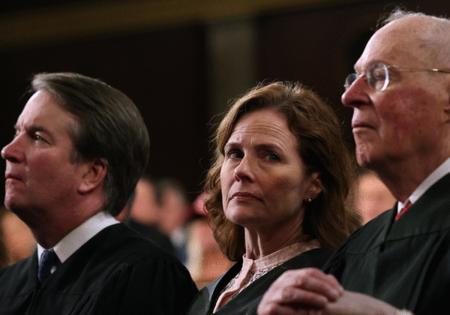Will the Supreme Court check Trump's unconstitutional acts? It may come down to one justice
Published in Political News
Increasingly it is clear that the only checks on the unconstitutional acts of the Trump administration will come from the courts. But will the conservative Roberts court, with three justices appointed by Donald Trump, be willing to stop the president’s illegal acts?
The answer is unclear, although a ruling on Friday afternoon is disturbing and indicates that enforcing the Constitution against the Trump administration may depend on one justice, Amy Coney Barrett.
The matter on Friday involved the Trump administration’s cutting off $65 million in teacher training grants from the U.S. Department of Education in February. The rationale? The grants included money for diversity, equity and inclusion initiatives.
California and other states filed suit in federal court in Boston to restore the funding. The federal judge granted a temporary restraining order against the Trump administration, concluding that its cutoff of funds was likely illegal and unconstitutional.
The money for teacher training had been appropriated by Congress in a federal statute. The president has no constitutional authority to usurp Congress’ spending power. Moreover, there is a federal statute, the Impoundment Control Act of 1974, that prohibits presidents from refusing to spend money appropriated by Congress.
In a 5-4 decision, the Supreme Court reversed the district court and lifted the temporary restraining order. The majority comprised Justices Clarence Thomas, Samuel A. Alito Jr., Neil M. Gorsuch, Brett M. Kavanaugh and Amy Coney Barrett. Chief Justice John G. Roberts Jr. joined the three liberal justices, Sonia Sotomayor, Elena Kagan and Ketanji Brown Jackson, in dissent.
Strikingly, the unsigned three-page majority opinion does not dispute that the cutoff of funds was unconstitutional and illegal. As Kagan said in a dissent, “Nowhere in its papers does the Government defend the legality of canceling the education grants at issue here.” Instead, the majority suggested that the federal government would be harmed by disbursing the money because, if it ultimately prevailed in the litigation, it would be unlikely to recoup the funds.
The majority also suggested that the appropriate forum for the case would be an action for breach of contract in the U.S. Federal Court of Claims, not a federal district court. The focus likely would no longer be on how the government was violating the Constitution and the Impoundment Control Act.
These are troubling arguments because they would greatly limit the authority of federal courts to prevent the president from unconstitutionally and illegally refusing to spend money appropriated by federal statute. And that would mean giving license to a huge shift in power over federal spending from Congress to the president.
Jackson wrote a powerful dissent explaining that temporary restraining orders generally are not reviewable on appeal, that the government was entitled to relief only if it could show there was an emergency situation that could cause irreparable harm, and that it long has been established that federal courts have authority to halt illegal cutoffs of federal funds.
She wrote: “It is beyond puzzling that a majority of Justices conceive of the Government’s application as an emergency. It is likewise baffling that anyone is persuaded that the equities favor the Government when the Government does not even argue that the lower courts erred in concluding that it likely behaved unlawfully.”
What is also puzzling is that just a few weeks ago, on March 5, the Supreme Court came to the seemingly opposite conclusion in another case involving the Trump administration’s cutting off of federal funds. In Department of State vs. AIDS Vaccine Advocacy Coalition, the court, 5-4, ruled that the federal district court has the authority to order the Trump administration to restore funding for the U.S. Agency for International Development.
In that instance Barrett joined the majority, along with Roberts, Sotomayor, Kagan and Jackson, and Alito wrote a blistering dissent, rejecting the authority of federal courts to order USAID’s funds to be restored.
It is unknown what difference Barrett saw between these two cases because she did not write opinions. But it seems to indicate that there are four justices (Thomas, Alito, Gorsuch and Kavanaugh) who will be with Trump at least in this area, and four who will be against the president (Roberts, Sotomayor, Kagan and Jackson). Whether and when the president can cut off funds seemingly will turn on Barrett’s views.
This is not a hard constitutional question. The president has no power under the Constitution or any federal law to block the spending of money appropriated by Congress.
There are several other emergency petitions filed by the Trump administration pending before the Supreme Court.
One involves the administration’s claim that federal courts have no authority to order the release of a man from a maximum security prison in El Salvador even when the government concedes he was put there wrongly. Another involves an order by a federal district court judge blocking the president’s efforts to use the Alien Enemies Act of 1798 to justify moving more than 200 Venezuelans to that same prison without due process.
Yet another administration petition involves whether federal courts can issue a nationwide injunction ending birthright citizenship for those born in the United States to parents who are not citizens. And another seeks to overturn a federal court order that said Trump acted illegally in firing individuals in six federal agencies.
The Supreme Court will no doubt act quickly on these petitions. These decisions will provide a strong indication of whether the justices will check the unconstitutional acts of the Trump administration. And if the court does not enforce the Constitution, then who will?
____
Erwin Chemerinsky is dean of the UC Berkeley Law School. His latest book is “No Democracy Lasts Forever: How the Constitution Threatens the United States.”
____
©2025 Los Angeles Times. Visit at latimes.com. Distributed by Tribune Content Agency, LLC.




























































Comments